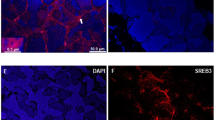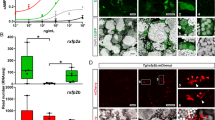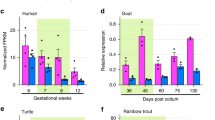Abstract
OESTROGEN-DEPENDENT synthesis of vitellogenin, the precursor of the major yolk proteins, in the liver of egg-laying vertebrates is an attractive model for investigating regulatory mechanisms of gene expression. Induction of vitellogenin synthesis by oestrogen occurs not only in the liver of females but also in males which normally do not produce this protein, thus showing that responsiveness to oestrogen is not linked to sex (for review see ref. 1). However, Follet and Redshaw2 reported that liver of Xenopus laevis larvae is refractory to oestrogen, becoming responsive shortly after completion of metamorphosis. As amphibian metamorphosis is known to be obligatorily dependent on thyroid hormones (for review see ref. 3), the question arises as to whether acquisition of competence to respond to oestrogen by the Xenopus liver cells is part of the hormonally regulated metamorphic changes or merely reflects age-dependent maturation. Here we present evidence that during normal development of Xenopus laevis the liver cells become responsive to oestrogen during metamorphosis and before vitellogenin synthesis has been initiated by endogeneous oestrogens. Moreover, we demonstrate that responsiveness to oestrogen fails to appear when metamorphosis is suppressed, but readily appears after induction of metamorphosis by thyroxine, suggesting that acquisition of competence to respond to oestrogen by the Xenopus liver cells is controlled by thyroid hormones.
This is a preview of subscription content, access via your institution
Access options
Subscribe to this journal
Receive 51 print issues and online access
$199.00 per year
only $3.90 per issue
Buy this article
- Purchase on Springer Link
- Instant access to full article PDF
Prices may be subject to local taxes which are calculated during checkout
Similar content being viewed by others
References
Ryffel, G. U. Molec. Cell Endocr. 12, 237–246 (1978).
Follet, B. K. & Redshaw, M. R. in Physiology of the Amphibia Vol. 2 (ed. Lofts, B.) 219–308 (Academic, New York, 1974).
Frieden, E. & Just, J. J. in Mechanisms of Hormone Action Vol. 1 (ed. Litwack, G.) 1–52 (Academic, New York, 1970).
Gallien, L. Bull. France Belg., 90, 163–183 (1956).
Weeke, B. A Manual of Qualitative Immunoelectrophoresis. Methods and Applications. (eds Axelsen, N. H., Krøll, J. & Weeke, B.) 37–46 (Universitets-forlaget, Oslo, 1973).
Nieuwkoop, P. D. & Faber, J. A normal table of Xenopus laevis Daudin (North Holland, Amsterdam, 1956).
New, D. A. T. The Culture of the Vertebrate Embryo (Logos-Academic, London, 1966).
Gasche, P. Experientia 2, 24–26 (1946).
Yamamoto, K. R. & Alberts, B. M. A. Rev. Biochem. 45, 721–746 (1976).
Westley, B. & Knowland, J. Cell 15, 367–374 (1978).
Knowland, J. Differentiation 12, 47–51 (1978).
Author information
Authors and Affiliations
Rights and permissions
About this article
Cite this article
HUBER, S., RYFFEL, G. & WEBER, R. Thyroid hormone induces competence for oestrogen-dependent vitelogenin synthesis in developing Xenopus laevis liver. Nature 278, 65–67 (1979). https://doi.org/10.1038/278065a0
Received:
Accepted:
Issue Date:
DOI: https://doi.org/10.1038/278065a0
This article is cited by
-
Rudolf Weber (1922–2015): a driving force in the transition of developmental biology into a molecular and cellular science
Development Genes and Evolution (2016)
-
Induction of female-specific serum proteins in the sand lamprey,Lampetra reissneri, by exogenous estradiol-17β
Japanese Journal of Ichthyology (1987)
-
Effects of thyroxine on the ontogeny of the vitellogenic response in Pleurodeles waltli of both sexes
Roux's Archives of Developmental Biology (1987)
-
Oestrogen receptor levels and vitellogenin synthesis during development of Xenopus laevis
Nature (1981)
Comments
By submitting a comment you agree to abide by our Terms and Community Guidelines. If you find something abusive or that does not comply with our terms or guidelines please flag it as inappropriate.



